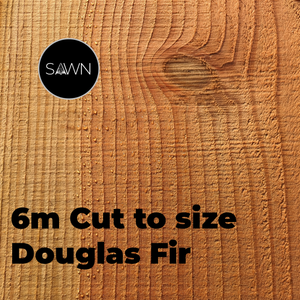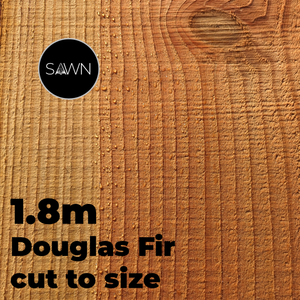
3.6m Cut to size Douglas fir
3.6m Cut to Size Douglas Fir – Strong, Reliable Timber for Your Building Needs
Our 3.6m Cut to Size Douglas Fir is the ideal solution for projects that demand both strength and aesthetic appeal. Known for its outstanding durability and versatility, Douglas Fir is perfect for everything from structural beams and framing to cladding and furniture. With our custom cut-to-size service, you’ll receive timber that’s ready to use, saving you time and minimizing waste.
Why Choose 3.6m Cut to Size Douglas Fir?
1. Exceptional Strength and Durability
Douglas Fir is one of the strongest and most durable softwoods, making it an excellent choice for both structural and decorative projects. Whether you're working on load-bearing beams, framing, or outdoor decking, Douglas Fir offers the strength needed to support your construction, ensuring your project stands the test of time.
2. Natural Beauty
The straight grain and even texture of Douglas Fir give it a distinctive appearance that is both clean and elegant. Its pale yellow to reddish-brown hues provide a warm, natural look that can be used in furniture making, interior woodwork, and exterior applications. Over time, the timber naturally weathers to a silver-grey patina, adding to its rustic charm, especially for outdoor applications.
3. Custom Cut to Size
With our cut-to-size service, your 3.6m Douglas Fir will arrive in the exact lengths required for your project, eliminating unnecessary cutting and waste. Whether you're building structural beams, garden decking, or fencing, we make sure your timber is delivered ready for installation, saving you both time and effort.
4. Lightweight Yet Strong
Douglas Fir is lightweight compared to other hardwoods, making it easier to handle and work with, whether you’re a DIY enthusiast or a professional contractor. Its balance of strength and weight makes it perfect for furniture building, frame construction, and decking projects, while still being easy to manage during installation.
5. Environmentally Responsible
At Sawn Sawmill, we are committed to offering timber that is sustainably sourced. Our 3.6m Douglas Fir comes from responsibly managed forests, meaning you can be confident that your purchase supports eco-friendly practices while ensuring high-quality timber for your projects.
Product Details
-
Material: Premium Douglas Fir
-
Length: 3.6m (custom cut to your requirements)
-
Finish: Sawn (retains natural texture, not planed smooth)
-
Colour: Pale yellow to reddish-brown, with a straight, clean grain
-
Durability: Naturally resistant to moisture, decay, and pests
-
Applications: Ideal for structural beams, furniture, decking, cladding, and more
-
Sustainability: Sourced from certified sustainable forests
Why Buy From Sawn Sawmill?
-
Premium Quality Timber: Our 3.6m Douglas Fir is carefully selected to ensure that you receive top-quality timber for your projects.
-
Cut-to-Size Convenience: With our custom cut-to-size service, we deliver your timber in the precise lengths you need, reducing waste and making installation faster and easier.
-
Fast Delivery: We ensure your timber arrives quickly and is ready to be used right away, so you can keep your project on schedule.
-
Expert Support: Our knowledgeable team is here to assist you with any questions and offer expert advice on choosing the right timber for your specific needs.
Order Your 3.6m Cut to Size Douglas Fir Today
Whether you’re working on a large-scale construction, decking project, or creating custom furniture, the 3.6m Cut to Size Douglas Fir offers a strong, versatile, and aesthetically pleasing solution. Order today, or contact us for more information and expert guidance to ensure your project turns out exactly how you envision it.








